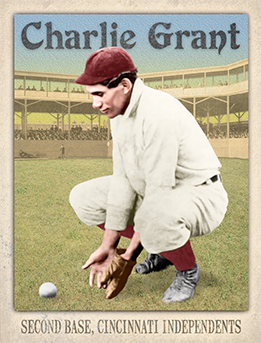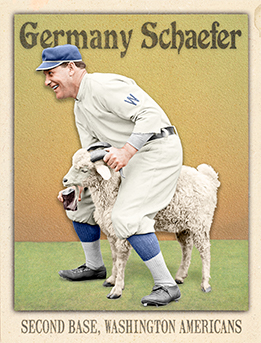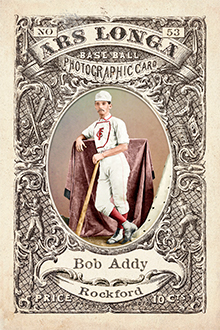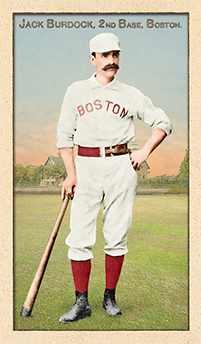
- Series: Diamond Heads '15
- City: Cincinnati
- Team: Stars (IND)
- League: Independent
Charles Grant Jr. (1874-1932) replaced Sol White at second base in 1896 when White left the Page Fence Giants, a move that came back to bite White's Cuban X-Giants later that year when Grant's team won the championship series 10 games to 5. Page Fence folded in '99 and Charlie moved to the Columbia Giants of Chicago. But is wasn't his prowess afield in the early Black leagues that brought Grant to the razor's edge of history. The smooth-fielding youngster worked in a hotel in Hot Springs, AR in the off-seasons where John McGraw's Orioles trained. McGraw, ever-voracious for talent, spied Grant playing pick-up games with co-workers and immediately judged him to be of major league caliber. The color-line was obdurate but McGraw seized on the ploy of passing Grant off as a Native American, even dubbing him “Tokohama” after a name he saw on the hotel's map. The scheme almost worked. Sol White tells the story of how McGraw's efforts to surreptitiously integrate the American League foundered when Baltimore went up to Chicago en route from spring training. Comiskey noticed that Grant's friends in town had shown up to applaud him and even sent a bouquet. Outed, McGraw had to yield to the league's segregation. White shared McGraw's esteem for Grant's ability: “I will give any 'fan' a good ten-cent cigar who will call my attention or, rather, recall my memory to an error on a ground ball or a muffed fly by Charley Grant.” His chance at national fame thwarted, Grant continued a very successful career in Black ball.
- Never a strong hitter, Grant always earned his keep at second. He died tragically, struck by a car that had blown a tire. In death, this great player received a measure of the recognition of which he was deprived by baseball's moguls. He is buried a short distance from Hall of Fame second-sacker Miller Huggins at Spring Grove Cemetery in Cincinnati
- Series: Pioneer Portraits I: 1850-1874
- City: Marshalltown
- Team: Stars (Amateur)
- League: Independent
- Hall: National Baseball Hall of Fame
Adrian Constantine Anson (1852-1922) was Mr. Longevity, a big, brawling cyclone of controversy & batsmanship unrivaled in the early days of pro ball. He set hitting standards that only the greatest future players would approach or break. He also, by dint of his ferocious personality, may have been the single greatest force for segregation in baseball until Branch Rickey began to reverse that sad estate.
- Played a record 27 consecutive years in the NL
- First batter to 3000 hits, using his powerful arms to create line drives with a short swing
- Managed the Chicago NL team to five pennants and still holds the Cub franchise records for hits, doubles, runs scored and runs batted in
- Elected to Hall of Fame: 1939
- Series: Beginnings: 1880's
- City: Boston
- Team: Beaneaters
- League: National League
John J. “Black Jack” Burdock (1852-1931) began and ended his 18 year career in Brooklyn, first for the Atlantics and retiring from the Bridegrooms (Grooms). Played for the Hartford Dark Blues during their 1st year in the new National League, ‘76, and the next when Hartford became the Brooklyn Hartfords for a year.
- Sandwiched in between his stints in Brooklyn were 10 years with the Boston Beaneaters
- Was player/mgr for the Boston Beaneaters’ 1883 pennant winner, leading the club in average at .330
- One of the best infield defenders of his era, Burdock led the NL in putouts by a 2nd baseman five straight years, 1876-1880
- Led his league in fielding percentage by a 2nd baseman 6 times
- Achieved a career .250 batting average with 1,231 hits, 778 runs and 501 RBI

- Series: Diamond Heads '15
- City: Washington, D.C.
- Team: Senators
- League: American League
Herman A. Schaefer (1876-1919) was the Clown Prince of baseball for nearly two decades in the early years of the last century. “Germany” (or “Liberty” as he thought a better nickname after WWI began) was beloved for his antics on the field. In its obituary, the New York Times said he was “one of the most popular figures on the diamond.” Born into the tough German immigrant district of south Chicago, the stocky Schaefer came up through semi-pro ball and soon made it to the Cubs in late 1901. A slump the following year sent him to the PCL and other minor league teams before the Tigers brought him back to the bigs in '05. Legends surrounded the colorful Schaefer and it is hard to tell fact from fiction. He was said to have called shots long before the Babe, make dramatic self-narrated trips around the bases and harangue mercilessly some of the greats of his day. One of his most storied feats involved his famed steal of first, accomplished from second base in order to tempt a run-scoring errant throw. After his death, baseball officially outlawed such depredations. John McGraw hired Schaefer as a scout in 1919 but the bantam joker succumbed to a TB-induced hemorrhage on a train trip to check on NY talent.
- Germany played for six MLB teams including the Federal League's Newark Peppers. He closed his career with Cleveland months before his untimely death
- His lifetime .257 average belied his ability to deliver clutch hits, seemingly at will, when the moment was right
- A Detroit sportswriter effused: “Germany Schaefer was the soul of baseball itself, with all its sorrows and joys, the born troubadour of the game.”

- Series: Pioneer Portraits I: 1850-1874
- City: Rockford
- Team: Forest Citys (NABBP)
- League: National Association (NABBP)
Robert Edward Addy (1845-1910) was in mid-career when he played for the Hartford Dark Blues in 1874. Having spent his early amateur and pro years with the Rockford Forest Citys, Bob was just the type of player Hartford treasured: an innovator. The hometown club of Mark Twain, the Dark Blues produced a remarkable string of “firsts” (for good and ill): 1) first team to have a captain; 2) who was also the first Jewish player in the majors—Lip Pike; 3) first to throw the curve—Candy Cummings; 4) first to bunt—Tommy Barlow; sadly, Barlow became the first big leaguer to forfeit his career to drug abuse; 5) first (and only) umpire to be expelled for throwing a game—Richard Higham, retired player. To this list was added Addy, the first to slide, a feat he piloted long before his season in CT. Not content with one “first” Bob sought years later to add “inventor of baseball on ice” to his resume, but for some reason, the idea never caught on. Ars Longa is indebted to historian David Arcidiacono for the above tidbits about Hartford's ball club. Addy was nicknamed “The Magnet” for his skill afield that helped the Boston Red Stockings to a pennant in '73. In fact, Addy was paid a superb tribute by no less than Cap Anson who, in a turn of the century book said: “Bob Addy, who was one of the best of the lot, was a good, hard hustling player, a good base runner and a hard hitter. He was as honest as the day is long . . . He was an odd sort of a genius and quit the game because he thought he could do better at something else.” Something involving bats and rinks apparently.
- Addy batted .277 for his pro career with a sole home run
- He managed parts of two seasons with the Philadelphia White Stockings and Cincinnati Reds




